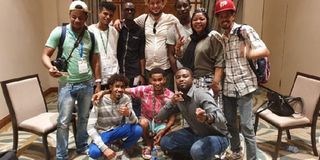Nurturing the future faces of the big screen

Some of the students from South Africa and Zanzibar who took part in film production lessons at ZIFF 2019 Edition. PHOTO I SALOME GREGORY
The 22nd edition of the Zanzibar International Film Festival (ZIFF) themed ‘The New Dawn’ hosted a series of workshops with six South African film students from different universities who joined other 12 students from Zanzibar at a students’ mentorship program and co-production in film production as well as exchange cultural knowledge with their Tanzanian counterparts.
The students from South Africa were Zinhle Ngwenya, Shaaheen Neil , Dalphia Kgaogelo Mojela , Palesa Mashao, Mpho Modisakeng and Sapho Wulana while their tanzanian counterparts were Arafat Khamis Mohammed Abdalla Hamid Haji Ibrahim Mohd Abdul-ghani Rashid Subira Omar Zawadi Joakim Ahmad Haroun Alfred Jackson and Ahmeid Sheikh.
Through a series of master classes and workshops during the nine days festival that started on 6th July to 14th July this year, students managed to make 18 short films thopugh only three were screened at the festival and the students were awarded certificates.
Speaking to Success, Firdoze Bulbulia the Festival Director said students attended a packed programmed delivered by film industry professionals and academics from across the world that came to Zanzibar to share their expertise and also learn new perspectives from young and emerging voices.
Adding to that she said, students from secondary schools and universities in Zanzibar also attended ZIFF for workshops focusing on media literacy. Workshops for the students included animation, acting and a media lab with a green screen and virtual reality experience.
She says the programme was made successful with the support of the South African National Film and Video Foundation (NFVF) and the KwaZulu-Natal Film Commission (KZNFC) and ZIFF.
“Following the workshops, students pitched 3-minute films to a panel of experts. There were 18 pitches that went through a rigorous process assessing storytelling, technique, relevance and feasibility of conveying a story in just three minutes. Three films were awarded the opportunity to be produced in 48 hours during the festival,” says Firdoze.
The pitching panellists students on the students’ mentorship program and co-production was made up of Elvin Ross from a filmmaker from Atlanta who is also award winning composer, Stacey Lefine the Events Manager at NFVF, Sipho Mabuse a legend musician, musician Yvonne Chaka Chaka and Simphiwe Ngcobo Production and Development Manager at KZNFC.
Commenting on the programme, Stacey Lefine the Events Manager at NFVF said, the student mentorship programme is a skills exchange programme between South African and Zanzibarian students. The programme educated students on the different aspects of the film industry including law, animation, script and African history of film.
Adding to that she said, the programme was suggested by the ZIFF and we thought it would a great opportunity for South African students to be a part of it. There was a 3- day co-production workshop for all the students from South Africa and Tanzania.
“A call was released to the students in South Africa to submit a motivation and from there the selection committee selected 6 students to attend and participate in the student programme. All the students who submitted had to be in their final year of study,” said Lefine.
Commenting on the co-produced film Lefine said, the films had incredible ideas. The panel felt that a lot of the films should be feature length films as they had so much depth.
Zinhle Ngwenya, 21, is a film student at the University of Johannesburg in South Africa. She is doing her last year in the Film and Television Studies course, and on Social Media.
Sharing her experience with the programme and how she learned about the programme she says, she came across a tweet that NFVF was calling for filmmaking students who are doing their final year to apply for the ZIFF Student Mentorship programme.
Adding to that she said the selected students will get mentorship from the filmmaking experts, collaborate with filmmaking students in Zanzibar, and work on producing a film together as a unified single production and as well as to create a network with other guests from various countries from all over the world for our own benefit in our filmmaking future.
“The program was amazing, hectic because we had to move around doing research on the cultures and all other areas of interests as far as our short films ideas were concerned but simultaneously very encouraging and engaging. Zanzibar people were very helpful, keen to help and share with us their stories, culture and general lifestyles as the permanent residents,” said Ngwenya.
Palesa Mashao is a 4th year Film and Television student at the University of Witwatersrand in South Africa.
She said, they attended a master classes where experts in various fields came and shared their knowledge with students and that was really quite helpful because a lot of film schools don’t get to know the real truth that happens in the industry.
Adding to that she said the program is very important as it is not often that one as a student gets a chance to interact with people who are already in the film industry or to even collaborate with students from other countries.
The program is a once in a lifetime opportunity for students to get to learn about their own African cinema, to collaborate with other African students and engage with experts.
“We had a master class on copyrights which a lot of people are not aware of and yet they play a huge role in the film industry. The session was quite eye opening for all of the ZIFF academy students and the South African students. The program is very important as it equips us students with not only the skills but the knowledge, history and the theory to be able to tell our very own African authentic stories,” said Mashao.
Abdul Jaffary is a Cinematographer based in Dar es Salaam. He coordinated for the participation of students from Zanzibar. He says it was never easy to get the students who are fully committed with the programmes but at the end 12 students managed to attend the master classes.
He said, he sees a bright future in the film industry as far as Zanzibar is concerned because young people seemed keen on filmmaking and in telling their own African stories that will speak to their people, stories that will strengthen the unity of their community and stories that will reflect their identity, lifestyles, cultures etc instead of copying the Western industry.
This year’s ZIFF introduced ZIFF Media Lab where students learned how to create videos, animation as well as apps that you can create interactive productions and learn the basics of digital thinking.
ZIFF Media Lab is important because film or animation (visual language) is everywhere and often is the language used to communicate online and on mobile screens. As well as on other platforms, such as TV, YouTube, video-on-demand like Netflix and of course on social media.




